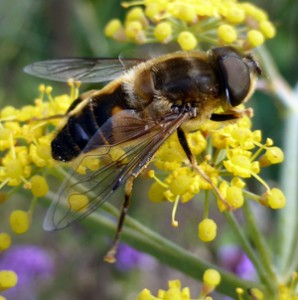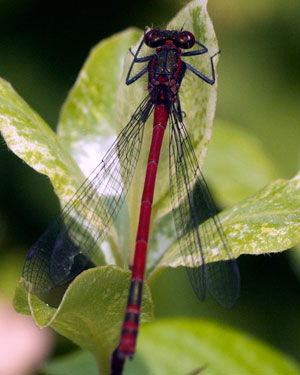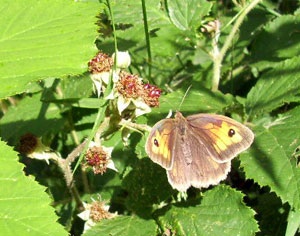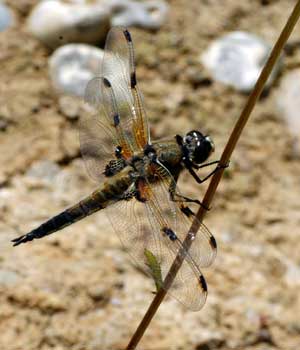Insect migration, the windscreen phenomenon and declining populations.

The migration of animals can have a massive impact on ecosystems - think of the migration of the enormous herds of caribou across the Alaskan plain. Each caribou may eat 3 kg of vegetation a day. With them come predators and parasites, and their waste (urine and faeces) contribute to nutrient and energy inputs to the ecosystem(s). An understanding of the migration of large animals & birds and ecosystem processes is well established, but the effects of large scale insect movements or bioflows have not been intensively studied (with the possible exception of locust swarms).
However, recently research workers have studied the movement of high flying insects over the southern counties of the U.K. Using specialised radar techniques, they looked at the night-time movement of larger insects flying at heights between 150 and 1200 metres (above the ground).
 Their work suggests that some 3.5 trillion insects move above the region each year - this approximates to 3200 tons of biomass. Broadly speaking, the research indicates a movement of insects northwards in the Spring and southwards in the autumn months. As the bodies of insects contain serious amounts of nitrogen and phosphorus (in the form of proteins and nucleic acids), this movement can represent a significant flow of nutrients between different ecosystems.
Their work suggests that some 3.5 trillion insects move above the region each year - this approximates to 3200 tons of biomass. Broadly speaking, the research indicates a movement of insects northwards in the Spring and southwards in the autumn months. As the bodies of insects contain serious amounts of nitrogen and phosphorus (in the form of proteins and nucleic acids), this movement can represent a significant flow of nutrients between different ecosystems.
However, these insects would not be directly involved in what has been termed the windscreen phenomenon. That is - there are far fewer squashed insects on one's car windscreen than there used to be some 40 years ago ; (even allowing for the more streamlined / aerodynamic shape of screen and car nowadays). Casual observations like this suggest that insect populations are in decline.
This possibility has received support from research work recently published from Germany - where a team has focused on the numbers of flying insects in nature reserves . Insects were caught (in malaise traps) and weighed in some 57 nature reserves spread across Germany. The study has run for some 27 years and yielded a cornucopia of data; which has been analysed by researchers from Nijmegen, Germany and England.
Over the period of the study, there has been an average decline of some 76% in the total mass of insects caught. In the middle of summer, when insect numbers ‘peak’, the decline has been even more severe (at over 80%).
 Caspar Hallmann (Radboud University) [who undertook the statistical analyses] said "All these areas are protected and most of them are managed nature reserves. Yet, this dramatic decline has occurred. “
Caspar Hallmann (Radboud University) [who undertook the statistical analyses] said "All these areas are protected and most of them are managed nature reserves. Yet, this dramatic decline has occurred. “
The causes of the decline are not clear. Changes in weather, landscape and vegetation are not thought to explain the decline. Though weather can explain some of the year-on-year fluctuations, it does not explain the overall and rapid downward trend. The reserves are surrounded by agricultural land and it has been suggested that the insects cannot survive in such farmland as
- it offers little in the way of food (be it wild flowers or other insects) or
- The insects are affected by exposure to agrochemicals (pesticides and herbicides) or
- a combination of both these things
Insects are vital as pollinators and also form part of the food web - acting as food for amphibians, small mammals, birds etc. So it is not perhaps surprising that we have witnessed declines in
are vital as pollinators and also form part of the food web - acting as food for amphibians, small mammals, birds etc. So it is not perhaps surprising that we have witnessed declines in
Indeed, across the U.K. the situation is quite serious - the 2016 State of Nature Report commented that the UK was “among the most nature depleted countries in the world”
Comments are closed for this post.
Discussion
The insect poulation will bounce back once the majority of the Human species has been eradicated. Nature will take care of it. We are an open cancer sore on the eco-system.

I would have to agree with your observations. I remember when I was significantly younger some 20 years ago that the front number plate of my car would be festooned with the remains of unfortunate insects that had come in to contact with it. Nowadays even in summer and after a commute of some 165 miles there are hardly any in comparison. I live in Devon and effectively traverse the South of the country to London.
Best Regards
Simon
Simon Jonwa
2 July, 2018